I have the following class for collecting device motion data:
class MotionManager: NSObject {
static let shared = MotionManager()
private override init() {}
// MARK: - Class Variables
private let motionManager = CMMotionManager()
fileprivate lazy var locationManager: CLLocationManager = {
var locationManager = CLLocationManager()
locationManager.delegate = self
locationManager.desiredAccuracy = kCLLocationAccuracyBest
locationManager.activityType = .fitness
locationManager.distanceFilter = 10.0
return locationManager
}()
private let queue: OperationQueue = {
let queue = OperationQueue()
queue.name = "MotionQueue"
queue.qualityOfService = .utility
return queue
}()
fileprivate var motionDataRecord = MotionDataRecord()
private var attitudeReferenceFrame: CMAttitudeReferenceFrame = .xTrueNorthZVertical
var interval: TimeInterval = 0.01
var startTime: TimeInterval?
// MARK: - Class Functions
func start() {
startTime = Date().timeIntervalSince1970
startDeviceMotion()
startAccelerometer()
startGyroscope()
startMagnetometer()
startCoreLocation()
}
func startCoreLocation() {
switch CLLocationManager.authorizationStatus() {
case .authorizedAlways:
locationManager.startUpdatingLocation()
locationManager.startUpdatingHeading()
case .notDetermined:
locationManager.requestAlwaysAuthorization()
case .authorizedWhenInUse, .restricted, .denied:
break
}
}
func startAccelerometer() {
if motionManager.isAccelerometerAvailable {
motionManager.accelerometerUpdateInterval = interval
motionManager.startAccelerometerUpdates(to: queue) { (data, error) in
if error != nil {
log.error("Accelerometer Error: \(error!)")
}
guard let data = data else { return }
self.motionDataRecord.accelerometer = data
}
} else {
log.error("The accelerometer is not available")
}
}
func startGyroscope() {
if motionManager.isGyroAvailable {
motionManager.gyroUpdateInterval = interval
motionManager.startGyroUpdates(to: queue) { (data, error) in
if error != nil {
log.error("Gyroscope Error: \(error!)")
}
guard let data = data else { return }
self.motionDataRecord.gyro = data
}
} else {
log.error("The gyroscope is not available")
}
}
func startMagnetometer() {
if motionManager.isMagnetometerAvailable {
motionManager.magnetometerUpdateInterval = interval
motionManager.startMagnetometerUpdates(to: queue) { (data, error) in
if error != nil {
log.error("Magnetometer Error: \(error!)")
}
guard let data = data else { return }
self.motionDataRecord.magnetometer = data
}
} else {
log.error("The magnetometer is not available")
}
}
func startDeviceMotion() {
if motionManager.isDeviceMotionAvailable {
motionManager.deviceMotionUpdateInterval = interval
motionManager.startDeviceMotionUpdates(using: attitudeReferenceFrame, to: queue) { (data, error) in
if error != nil {
log.error("Device Motion Error: \(error!)")
}
guard let data = data else { return }
self.motionDataRecord.deviceMotion = data
self.motionDataRecord.timestamp = Date().timeIntervalSince1970
self.handleMotionUpdate()
}
} else {
log.error("Device motion is not available")
}
}
func stop() {
locationManager.stopUpdatingLocation()
locationManager.stopUpdatingHeading()
motionManager.stopAccelerometerUpdates()
motionManager.stopGyroUpdates()
motionManager.stopMagnetometerUpdates()
motionManager.stopDeviceMotionUpdates()
}
func handleMotionUpdate() {
print(motionDataRecord)
}
}
// MARK: - Location Manager Delegate
extension MotionManager: CLLocationManagerDelegate {
func locationManager(_ manager: CLLocationManager, didChangeAuthorization status: CLAuthorizationStatus) {
if status == .authorizedAlways || status == .authorizedWhenInUse {
locationManager.startUpdatingLocation()
} else {
locationManager.stopUpdatingLocation()
}
}
func locationManager(_ manager: CLLocationManager, didUpdateLocations locations: [CLLocation]) {
guard let location = locations.last else { return }
motionDataRecord.location = location
}
func locationManager(_ manager: CLLocationManager, didUpdateHeading newHeading: CLHeading) {
motionDataRecord.heading = newHeading
}
}
However I'm getting EXC_BAD_ACCESS after it runs for a while. I ran the zombie instrument and it appears that handleMotionUpdate() is the caller at fault. And MotionDataRecord or some of it's properties are what are being deallocated somehow...
MotionDataRecord is a struct:
struct MotionDataRecord {
var timestamp: TimeInterval = 0
var location: CLLocation?
var heading: CLHeading?
var motionAttitudeReferenceFrame: CMAttitudeReferenceFrame = .xTrueNorthZVertical
var deviceMotion: CMDeviceMotion?
var altimeter: CMAltitudeData?
var accelerometer: CMAccelerometerData?
var gyro: CMGyroData?
var magnetometer: CMMagnetometerData?
}
Any ideas what's going on here?
Edit:
Have added a stripped down version of the project to github here
Edit:
Screenshot of zombies instrument:
